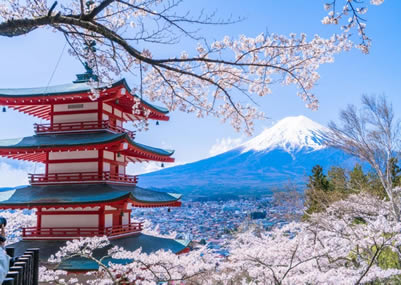Japan
Japan is an archipelago, or string of islands, on the eastern edge of Asia. There are four main islands (Hokkaido, Honshu, Shikoku, and Kyushu) plus nearly 4,000 smaller islands. Japan's nearest mainland neighbors are the Siberian region of Russia in the north and Korea and China farther south.
The ''Land of the Rising Sun'' is a country where the past meets the future. Japanese culture stretches back millennia, yet has also been quick to adopt and create the latest modern fashions and trends.
Japan is often difficult to understand for those educated in the west. It can seem full of contradictions. Many Japanese corporations dominate their industries, yet if you read the financial news it seems like Japan is practically bankrupt. Cities are as modern and high tech as anywhere else, but tumbledown wooden shacks can still be spotted next to glass fronted designer condominiums. Japan has beautiful temples and gardens which are often surrounded by garish signs and ugly buildings. The most acclaimed restaurant in the country, which costs hundreds of dollars for dinner, is a small shop located in a subway station seating less than a dozen people. In the middle of modern skyscrapers youíll discover sliding wooden doors which lead to traditional chambers with tatami mats, shoji screens, and calligraphy, suitable for traditional tea ceremonies. These juxtapositions can seem perplexing or jarring to those used to the more uniform nature of European and North American cities, but if you let go, and accept the layered aesthetics, youíll find interesting and surprising places throughout the country.
Japan has often been seen in the West as a land combining tradition and modernity, and many traditional structures and practices are preserved, but modern structures and practices definitely dominate your experience in Japan. Japan was the first Asian country to independently modernize, and the country continues to embrace new technologies and aesthetics, but unlike in many countries, Japan does not feel a particular need to attack or remove older technologies, structures, or practices. New things are mostly just layered beside old things. Thatís not to say that Japan embraces the large scale preservation of historical structures or that people generally practice traditional ceremonies, but people generally believe that if a small number of people want to continue on a tradition or preserve a building that they own, they should be allowed to do that. In this way, development mostly happens in a piecemeal fashion, one building at a time, rather than in large redevelopment projects. Many urban blocks evolve to line up dozens of narrow buildings spanning fifty or more years of design history. Clothing styles evolve along a dozen paths at the same time rather than singular mass fashion trends. An individual that embraces a particular subculture and its fashions may alternately conform to vary different norms when working or at home, but there is little sense of conflict between these roles.
Other Destinations of Japan


